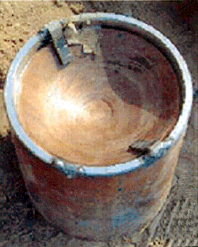US claims Iraqi militants armed with Iranian weapons
Monday, February 12, 2007

During a press conference yesterday, United States military and intelligence officials presented material they say link weapons used by Iraq fighters to Iran. Defense Secretary Robert Gates told reporters in Madrid on Friday that the there was "pretty good" evidence that Iranians are supplying either weapons or technology to Iraqi militants. No recording devices of any kind were allowed during the press conference.
Reacting to the U.S. claims, Iran's President Mahmoud Ahmadinejad said in a television interview that the allegations were "excuses to prolong the stay" of the U.S. military in Iraq, and that the U.S. was pointing fingers at others in an effort to "hide its defeats and failures"; however in an interview with Diane Sawyer on February 12th, Ahmadinejad refused to address accusations that his country was supplying weapons to insurgents in Iraq. Iranian Foreign Ministry spokesman Mohammad Ali Hossein termed the accusations baseless propaganda and said that the U.S. had a long history of "fabricating evidence".
American officials displayed weaponry including Explosively Formed Penetrators (EFPs) and thermal detectors used for remotely exploding bombs. Some of the weapons parts bear the markings that the officials associated with Iranian manufacture. The officials claimed that such sophisticated weaponry could not have been assembled by the Shia militia and said that it must have been supplied from neighbouring Iran. The U.S. view is that only a state arms company would have the ability to manufacture weapons of this kind and the officials maintained that the weapons were smuggled in to Iraq by the Qods Force of the Islamic Revolutionary Guard Corps (IRGC) and have estimated that such an operation was known to the Iranian government and encouraged by it, but did not present any evidence to support the claims.
The U.S. evidence is being met with close scrutiny, after the experience of pre-Iraq war U.S. intelligence estimates of Saddam Hussein's weapons capability and links with Al-Qaeda, which were found to be inaccurate. When asked why this information was being released at this specific moment, even though the information had accumulated since 2004, the officials explained that they saw a near doubling of EFP attacks in 2006.
The U.S. claims that the such weapons have killed at least 170 troops and a much higher number of Iraqi civilians. Secretary Gates said that the EFPs did not form a large proportion of roadside bombs but that they were "extremely lethal". Improvised explosive devices have been a big killer of both Iraqi civilians and Allied forces in Iraq. Tens of thousands of civilians and over 3000 Allied troops have died in the nearly four-year-old Iraq war.
The exchanges come during a period of heightened tension between Iran and the U. S. over Iran's nuclear programme. The U.S. deployed a second aircraft carrier strike force in the Persian Gulf last month.
Sources
- "Iran 'does not fear attack by US'" — BBC News Online, February 12, 2007
- David Blair and Ben Rooney. "US presents 'evidence' that weapons from Iran are being used in Iraq" — The Daily Telegraph, February 12, 2007
- James Glanz. "U.S. Says Arms Link Iranians to Iraqi Shiites" — New York Times, February 12, 2007
- Charles Crain. "How Much is Iran to Blame for Iraq?" — Time (magazine), February 12, 2007
- James Glanz. "U.S. officials in Iraq display weapons traced to Iran" — International Herald Tribune, February 12, 2007
- Pauline Jelinek and Katherine Shrader, Associated Press. "Gates: Bomb markings implicate Iran" — Concord Monitor, February 10, 2007
- Diane Sawyer. "Exclusive: Iranian president ducks charges that Iran is supplying Iraqi insurgents" — ABC News, February 12, 2007